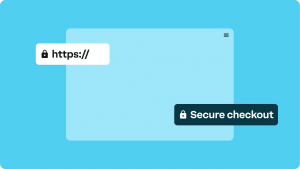Key takeaways
- Shopify alternatives can help reduce costs, improve customization, and better match your business model.
- User reviews suggest that you can find cheaper, more flexible, and more scalable alternatives to Shopify.
- Network Solutions offers an all-in-one eCommerce website builder with a free domain, SSL, and email.
As of 2025, there are over 36 million small businesses in the U.S. Moreover, experts predict that the eCommerce industry will value more than $8.1 trillion by 2026. Given the crowded and competitive market, how can your small business compete in this fast-growing environment?
With the help of the right website builder, you can create a strong online presence and eCommerce store. Shopify’s website builder can give your website a running start, but it’s not always the best option for small business owners who want a simpler and better unified solution for a good price.
This guide explores the top Shopify alternatives offering better pricing, flexibility, and tailored features for SMBs and startups.
How we developed this list
Rather than conducting extensive hands-on product testing, we focused heavily on consolidating and analyzing over 110 user experiences from reputable review platforms to give you a more user-based perspective.
We curated this list based:
- User feedback from Trustpilot, Reddit, YouTube, G2, and Capterra
- Cross-platform review analysis to identify consistent pros and cons
- Feature and pricing comparisons using internal tools and public data
- Limited hands-on testing via free trials and demo accounts
Disclaimer: This article is for informational purposes only. Pricing and features are accurate at the time of writing but may change. Please consult each provider for the latest updates.

Comparison of the best Shopify alternatives
To help you choose the right platform for your business, here’s a side-by-side comparison of the top Shopify alternatives based on monthly pricing, key features, and ideal use cases:
- Network Solutions
- Wix
- GoDaddy
- Weebly
- Squarespace
Important:
- Transaction fees per sale apply to all brands (varies depending on tier and payment processor).
- For comparison, Shopify’s most basic plan starts at $39 / month (if billed monthly). Their basic plan includes most of the core features listed below
| Platform | Pricing (starts at) | Key features | Best for |
|---|---|---|---|
| Network Solutions | $9.99/month | AI-powered website builder, 1-year free domain & privacy, 3-month free professional email, 1-month free SSL certificate, logo builder & design studio, social media marketing & email, Google My Business listing, accept payments, SEO, marketplace selling, 24/7 support | Small businesses and solopreneurs who want a simple but unified eCommerce and marketing ecosystem experience (without relying too much on third-party plug-ins) |
| Wix | $29.00 / month | Basic eCommerce, 1-year free domain, storage space, multi-cloud hosting, basic marketing suite, accept payments, scheduling services, 5 site collaborators, 24/7 support | Small businesses and creatives who want more design flexibility |
| GoDaddy | $29.99/month | eCommerce website builder, accept payments, 100+ templates, unlimited product and service inventory, marketplace selling, email marketing, 24/7 support | Local businesses and service providers |
| Weebly | Free (Weebly sub-domain) | Accept payments, SEO, website builder | Budget-conscious sellers using Square |
| Squarespace | $25.00/ month | Accept payments, SEO, appointment scheduling, and AI builder | Design-focused brands and portfolios |
1. Network Solutions
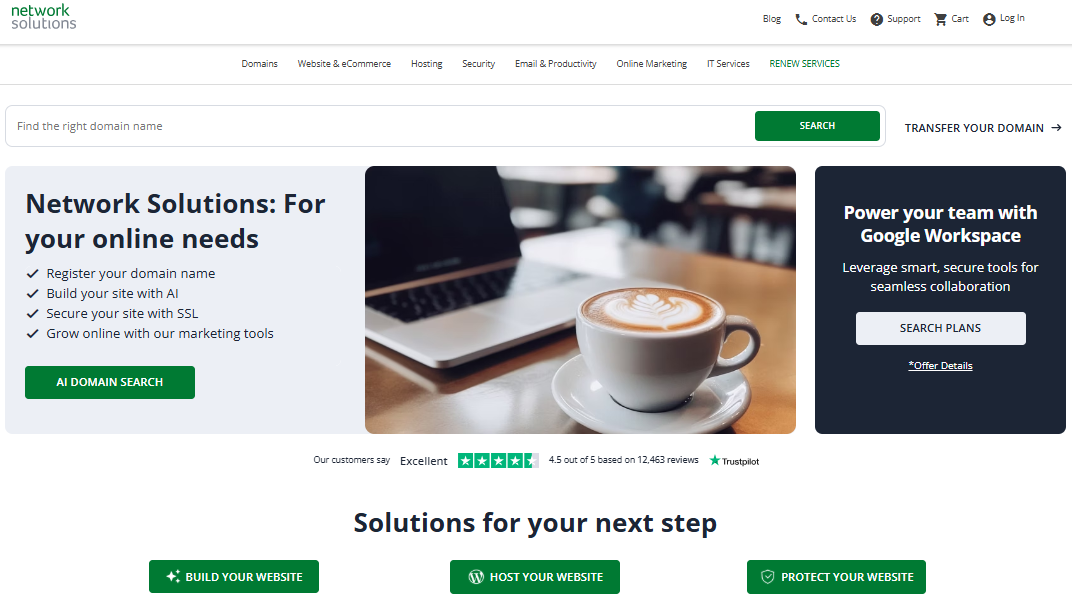
Network Solutions is a long-standing digital service provider that offers domain registration, web hosting, website security, and online marketing. Its eCommerce website builder is designed for small to mid-sized businesses that want a simple, integrated way to sell online. It’s a good Shopify alternative, especially for users who want to get their online stores quickly without juggling multiple providers or managing complex tools.
Key unique features
- Unified business platform. Offers domain registration, hosting, website building, email, and SSL in one place. With our eCommerce plan, you can get a comprehensive suite of useful eCommerce functionalities plus free domain and privacy protection for the first year. You can also secure your site and build trust with visitors using a free SSL certificate for the first month.
- Cost-effective entry point. Network Solutions’ eCommerce plan starts at $9.99/month (and renews at $29.99/month). One month (prior renewal) is usually long enough to determine suitability for your unique use case.
- AI-powered setup tools. We have features like AI domain name generation and content creation that help users get online faster. You can also build your online store with ease using our intuitive drag-and-drop builder enhanced with AI.
- Templates built for business. Our website designs include layouts tailored to service providers, retailers, and professional firms.
- Social media marketing and email campaigns. You can promote your products across platforms through integrated social media posts and email marketing.
- Google My Business Listing. Google My Business can help customers find you through search and maps, complete with business hours, contact info, and reviews.
- Accept payments online. Secure and flexible payment options for your customers, including credit cards, PayPal, and other popular gateways.
- SEO optimization tools. Customize meta tags, URLs, alt text and other SEO-enhancing elements to help your products rank higher and attract organic traffic.
- Marketplace selling. Expand your reach by listing products on major marketplaces like amazon, eBay, Facebook, and Instagram.
- Appointment scheduling. Enables service-based businesses to accept bookings directly through the site.
- 24/7 customer support. Get expert help whenever you need it. Network solutions offers business consulting via plus round-the-clock product support via chat to ensure your store runs smoothly.
Who it’s best for
- Entrepreneurs and small business owners who want a streamlined, all-in-one solution for launching a professional website.
- Users who prefer simplicity and reliability over advanced design customization.
- Businesses looking for cost-effective tools that include domain, hosting, email, and eCommerce features without managing multiple subscriptions.
What users are saying
Business owners often appreciate Network Solutions for its reliability and integrated services. Many users mention that the platform makes it easy to manage domains, hosting, and email in one place.
Cybernews took the time to do an in-depth review of Network Solutions plans and services and gave us a high rating. They even said, “…it’s clear that the builder could be a good option for small businesses with tight purse strings. The builder is cheap, easy to use, and very fast.”
One customer also praised Network Solution’s Website Builder and maintenance saying, “We are very pleased with our website as built and maintained through Network Solutions. The artist/[IT] people are wonderful.”
Pricing and plans
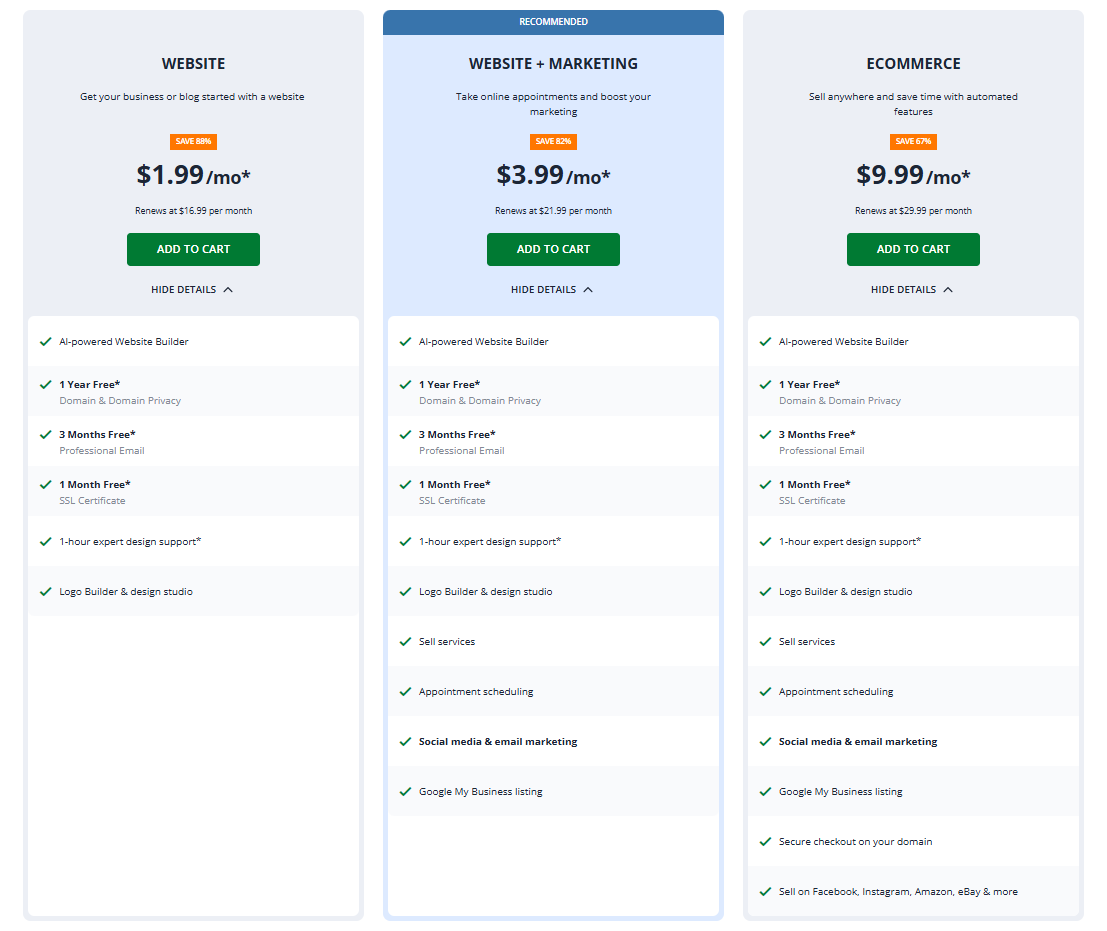
Compared to Shopify’s Basic plan, Network Solutions’ eCommerce plan is more budget-friendly upfront at $9.99 on your first month, then $29.99/month after.
Note: Pricing is current at the time of writing but can change without prior notice. Please check with the provider directly for the most up-to-date pricing.
2. Wix
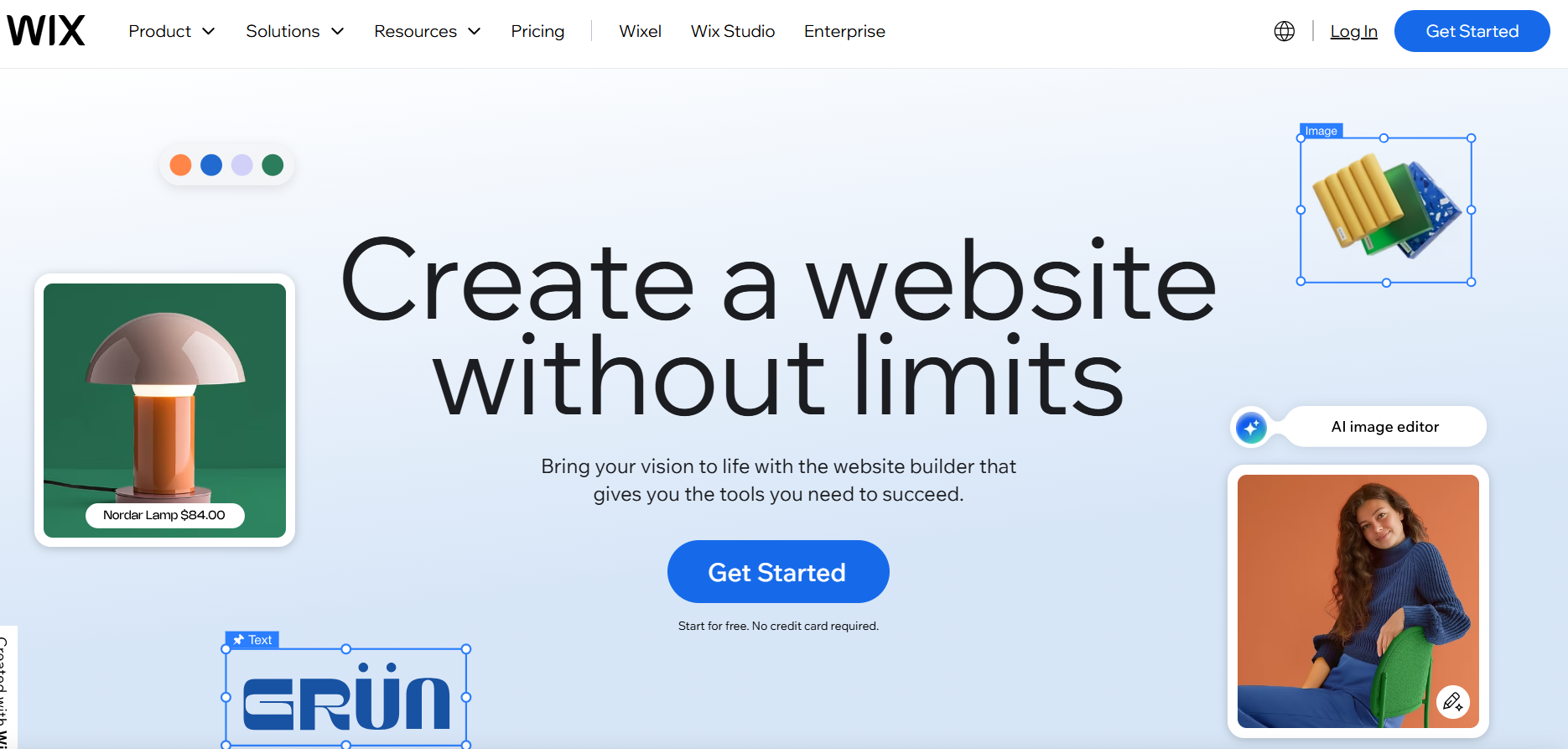
If you want to build a professional website without a coding background, Wix is a Shopify alternative worth considering. Launched in 2006, it offers a wide range of features suitable for various business needs. For small to medium-sized businesses, Wix provides an accessible entry point into eCommerce.
While customers know Shopify for its eCommerce features, Wix offers a more straightforward approach and integrates essential tools within its platform. This makes it suitable for businesses looking for simplicity and design flexibility.
Key unique features
- Drag-and-drop design. Wix lets users customize their site without coding know-how. It’s perfect for small businesses that want full control over their brand’s look without needing to hire an expert.
- AI site builder (Wix ADI). This feature automatically generates a website based on user input.
- Free domain for one year. Includes a complimentary domain registration for the first year.
- 50 GB storage. Provides up to 50 GB of space for website content, media, and files.
- Multi-cloud hosting. Uses distributed hosting infrastructure to support site performance and reliability.
- Basic marketing tools. Offers foundational tools for email campaigns and social media integration.
- Online selling capabilities. Supports product listings, payment processing, and order management for ecommerce.
- Up to 5 site collaborators. Allows multiple users to manage the site with assigned roles.
- Site analytics. Provides access to basic visitor and traffic data.
- 24/7 customer support. Offers round-the-clock assistance via chat or phone.
Who it’s best for
- Creatives, freelancers, and boutique brands who want design flexibility without needing to code.
- Business owners who value aesthetics.
- Users who prefer intuitive tools and AI assistance.
What users are saying
Users love Wix for its design flexibility and ease of use. A lot of reviews mention their drag-and-drop builder, especially by those without technical backgrounds.
A review from G2 specifically said, ” I like that Wix makes it really easy to design a professional-looking website without needing coding skills.” However, there are also points that they didn’t like, “Sometimes the editor can feel a little heavy and slow, especially if the website has a lot of elements. Also, once you pick a template, it’s not easy to switch to another one without starting over, which can be a bit limiting.”
Pricing and plans
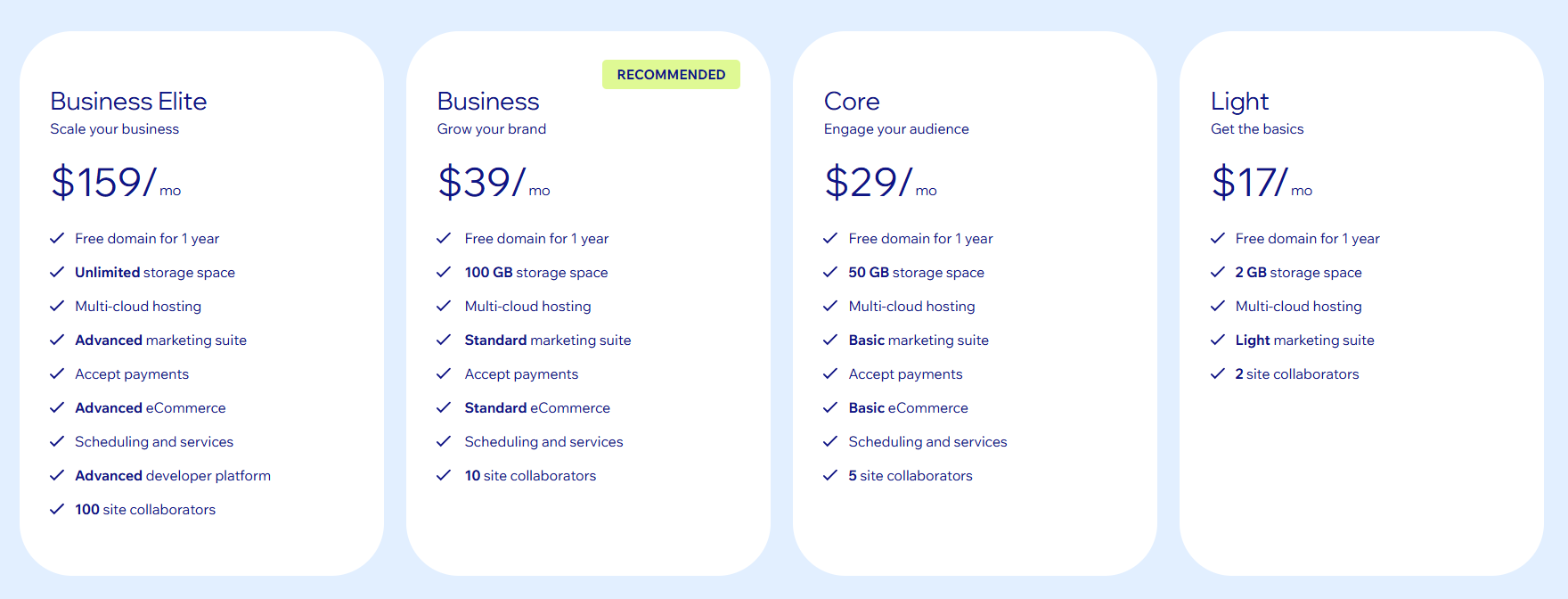
Although Wix Core (starter plan for basic commerce) bills at $29/month, its counterpart Shopify Basic includes a generous 3-month promo at $1/month, making it more attractive for new users testing the platform. Wix Core, while slightly more expensive on a monthly basis, includes a free domain, professional email, and built-in marketing tools, which may reduce the need for third-party apps and extra costs.
Note: Pricing is current at the time of writing but can change without prior notice. Please check with the provider directly for the most up-to-date pricing.

3. GoDaddy
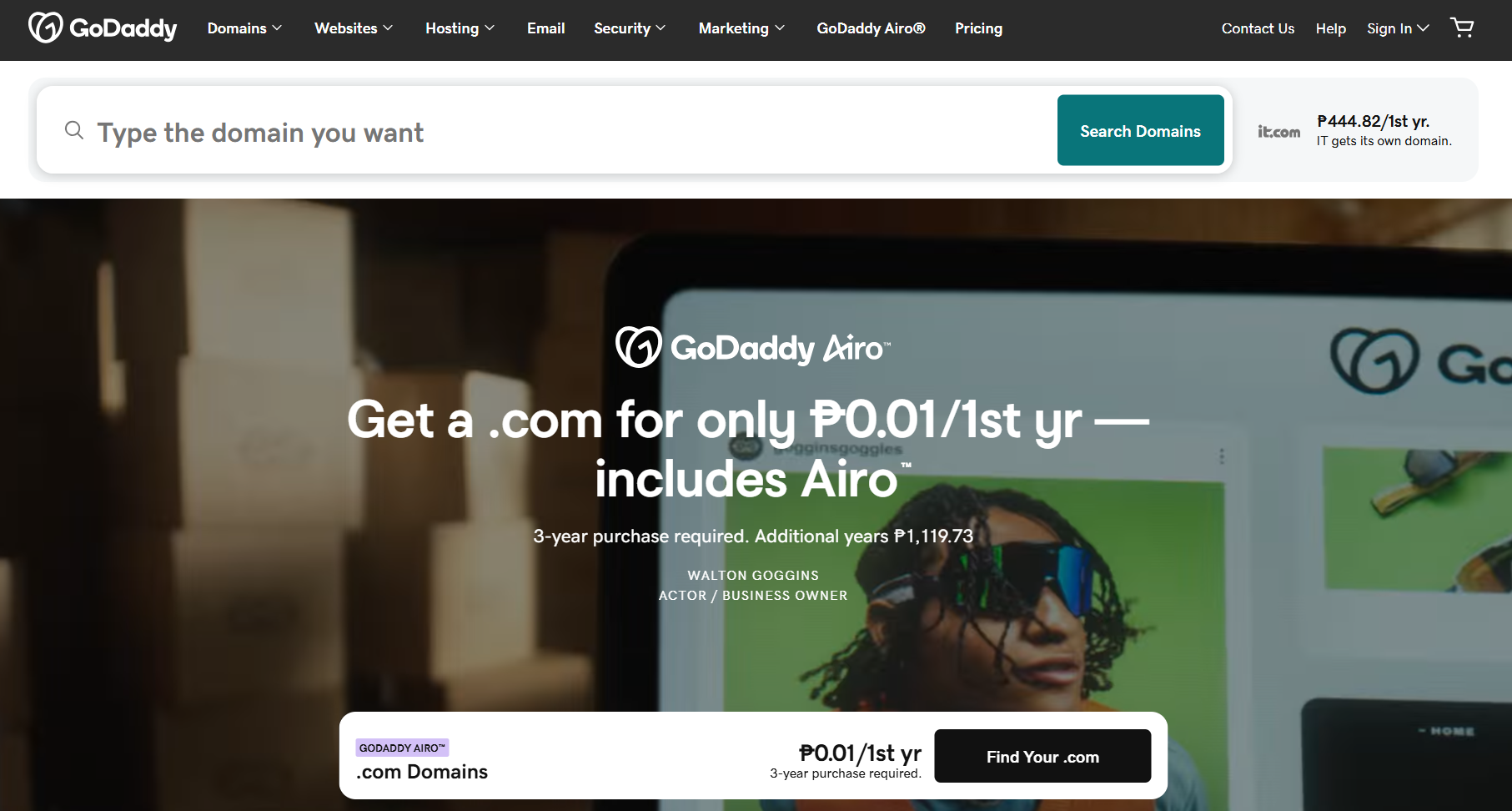
GoDaddy is another household name for domain registration, but its website builder also provides a full-service platform for small businesses.
In terms of usability, GoDaddy is straightforward and beginner-friendly, though it may lack the advanced customization options found in platforms like Shopify. The platform’s competitive pricing is especially appealing for local business tools like appointment scheduling and directory listings.
Key unique features
- All-in-one dashboard. GoDaddy combines website building, marketing, and eCommerce tools in one place, streamlining setup for busy business owners.
- Unlimited product listings. Sell as many products as you want without restrictions.
- Inventory synchronization. Automatically sync stock levels across all connected sales channels to avoid overselling.
- Local business tools. The service includes appointment scheduling, directory listings, and social media posting — ideal for service providers and brick-and-mortar shops.
- Marketing and SEO tools. Includes built-in tools for email marketing, SEO optimization, and social media promotion.
- Multiple payment options. Accept payments via credit cards, PayPal, Apple Pay, Google Pay, Venmo, Stripe, and Square.
- Security features. SSL encryption, firewall protection, malware scanning, and one-click backups.
- 24/7 customer support. Access live chat, phone support, and a knowledge base anytime.
Who it’s best for
- Local service providers and small businesses that need a cohesive platform for managing tools like scheduling, listings, and marketing.
- Entrepreneurs who want quick setup
- Users that prefer having access to built-in advertising and promotional tools.
What users are saying
GoDaddy reviews are more mixed. Users appreciate the convenience of managing domains and websites in one place, and some mention that the platform is easy to use for basic websites.
However, they often encounter roadblocks for advanced eCommerce features and customization options. One user even stated, “Found it expensive, hard to understand the dashboard, complicated login process to access the account.”
Pricing and plans
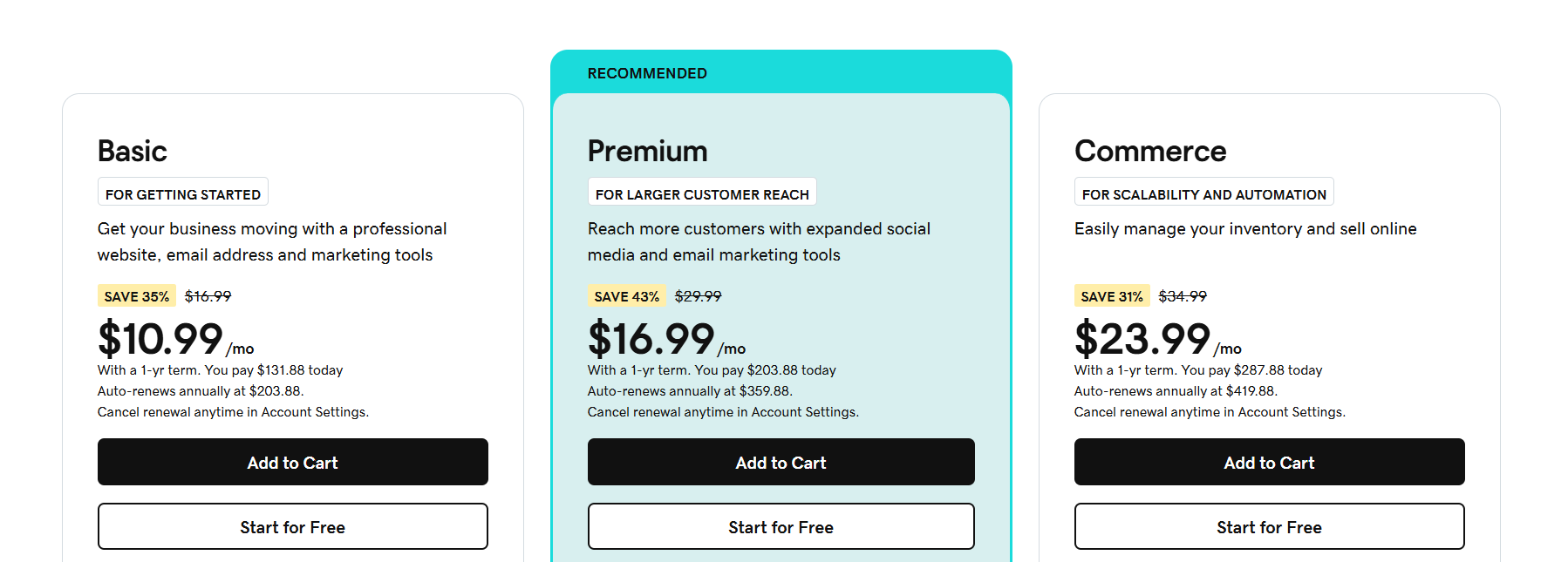
GoDaddy Commerce Plan is slightly more affordable and includes a wide range of built-in features like marketplace integration, inventory sync, and AI-driven personalization. It’s ideal for small businesses looking for an all-in-one solution with minimal reliance on third-party apps.
Shopify Basic, while more expensive, offers stronger scalability, a broader app ecosystem, and advanced eCommerce tools like abandoned cart recovery and basic POS integration. It’s better suited for businesses planning to grow quickly and needing more customization and control.
Note: Pricing is current at the time of writing but can change without prior notice. Please check with the provider directly for the most up-to-date pricing.
4. Weebly
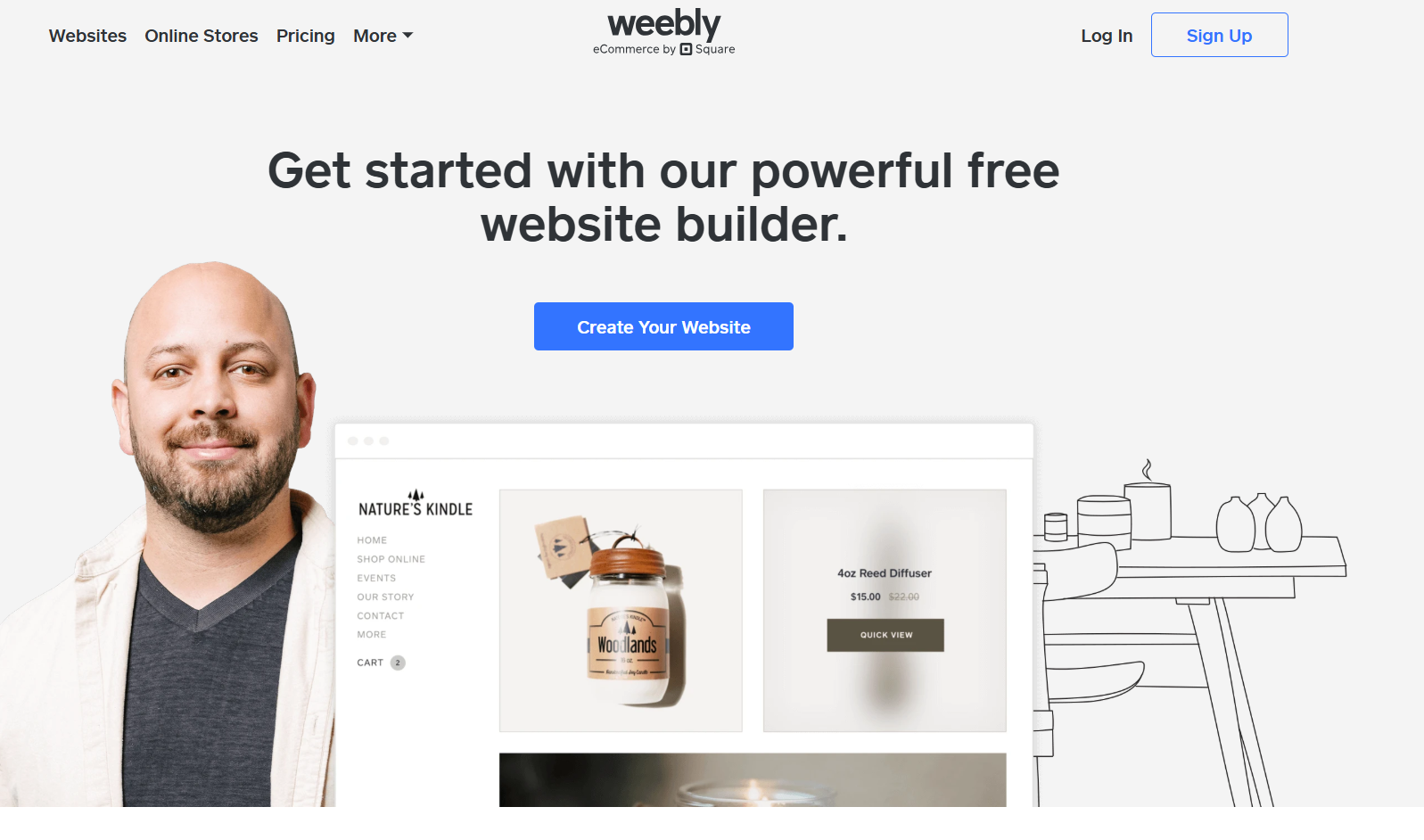
Weebly, now part of Square, is known for its simplicity and affordability. It’s a go-to choice for entrepreneurs who want to quickly launch an online store, especially those already using Square for in-person sales.
Compared to Shopify, Weebly is lean and budget friendly. Though it may not offer the same depth of features as Shopify, its eCommerce tools are tightly integrated with Square, making it ideal for omnichannel sellers.
Key unique features
- Square integration. Seamlessly connects online and in-person sales.
- Simple eCommerce setup. Lets users launch a store quickly with minimal steps.
- Free plan available. Offers a no-cost entry point for testing business ideas before committing to a paid plan.
- Drag-and-drop website builder. Offers an intuitive editor that allows users to build and customize websites without coding.
- Weebly-branded subdomain. Sites on the ‘Free’ plan are published under a Weebly subdomain (e.g., yoursite.weebly.com)
- SSL security. Free SSL encryption is provided to ensure secure data transmission.
- Basic eCommerce tools. Includes a shopping cart, unlimited product listings, item options, digital goods support, and inventory management.
- Automatic tax calculator. Calculates sales tax automatically during checkout.
- In-store pickup option. Allows customers to choose local pickup if applicable.
- Coupons and square gift cards. Supports basic promotional tools like discount codes and gift cards.
- Shipping calculator. Provides basic shipping cost estimates.
- SEO and lead capture tools. Includes essential SEO settings and lead capture forms.
- Weebly ads displayed. Free plan sites display Weebly branding and ads, which can only be removed by upgrading.
- Limited support access. Users have access to community forums and email/chat support, but no phone support.
Who it’s best for
- Sellers who operate both online and in-person and want seamless integration with Square’s POS system.
- Budget-conscious entrepreneurs who need a simple, functional eCommerce site without upfront costs.
- Small retailers and side hustlers who prioritize speed and ease of setup over deep customization.
What users are saying
Weebly is simple and smoothly integrates with Square. Users who sell both online and in-person find it convenient to manage inventory and payments across channels. Also, the free plan is a popular entry point for new sellers. However, some users feel the platform is too basic and lacks flexibility. Design options are limited, and advanced features require upgrading.
Here’s a review from one of its users, “It was fine for a while, but then it all just went bad. First, it got harder to navigate, and a misclick could mess up the whole thing. But the real problem started today. I was checking on the website when it broke. There’s no other word for it. The functionality broke, and we lost access to half of our pages. The font changed, and we lost buttons.”
Pricing and plans
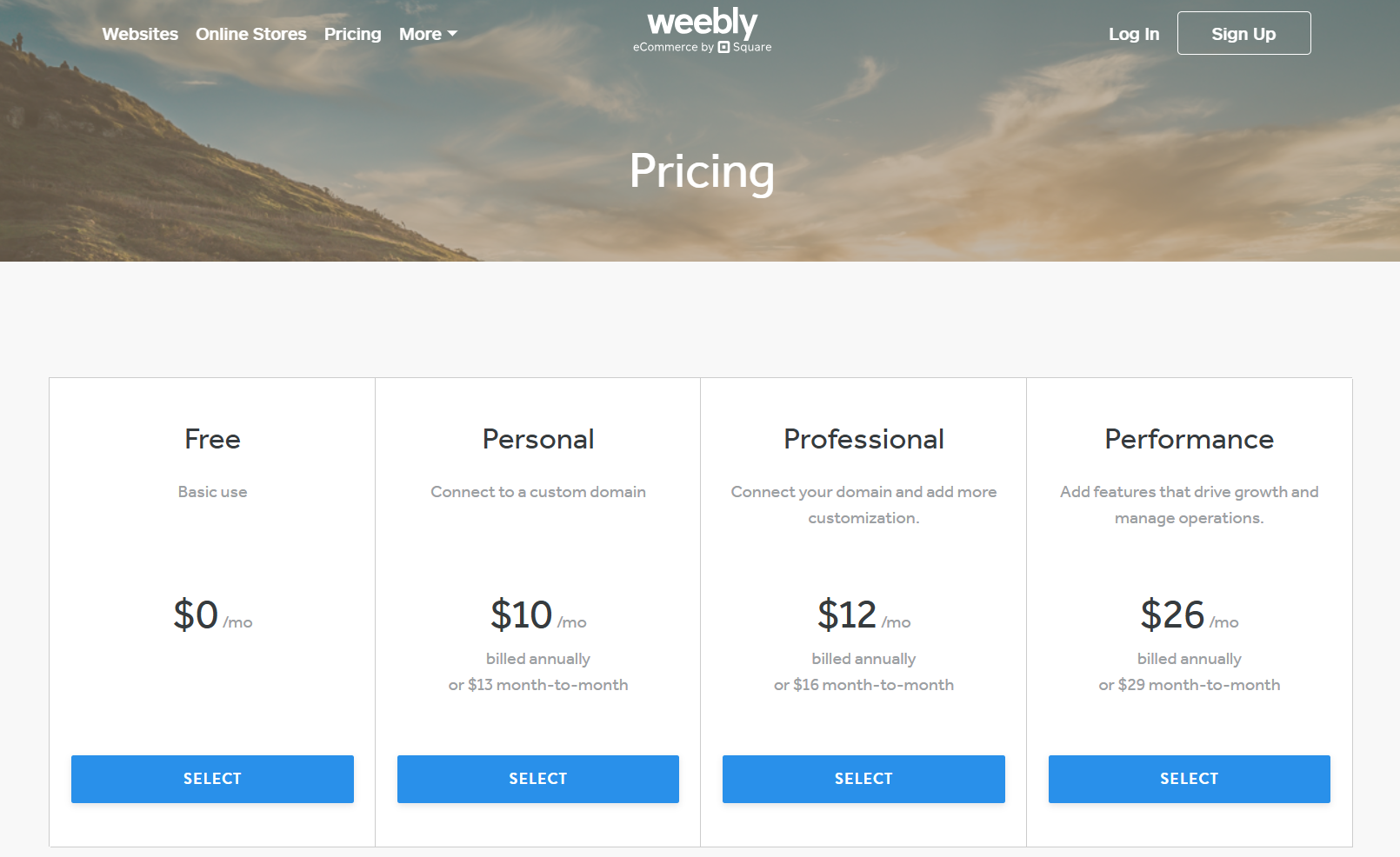
The biggest benefit of Weebly is their free plan with basic eCommerce features. It allows unlimited product listings and includes a shopping cart, but is limited in payment options, customization, and branding due to the Weebly subdomain and ads.
In contrast, the Shopify Basic Plan offers a more complete eCommerce solution with professional checkout, broader payment support, and scalability features like inventory locations and international sales tools. However, it comes at a monthly cost and may require additional apps for full functionality.
Note: Pricing is current at the time of writing but can change without prior notice. Please check with the provider directly for the most up-to-date pricing.
5. Squarespace
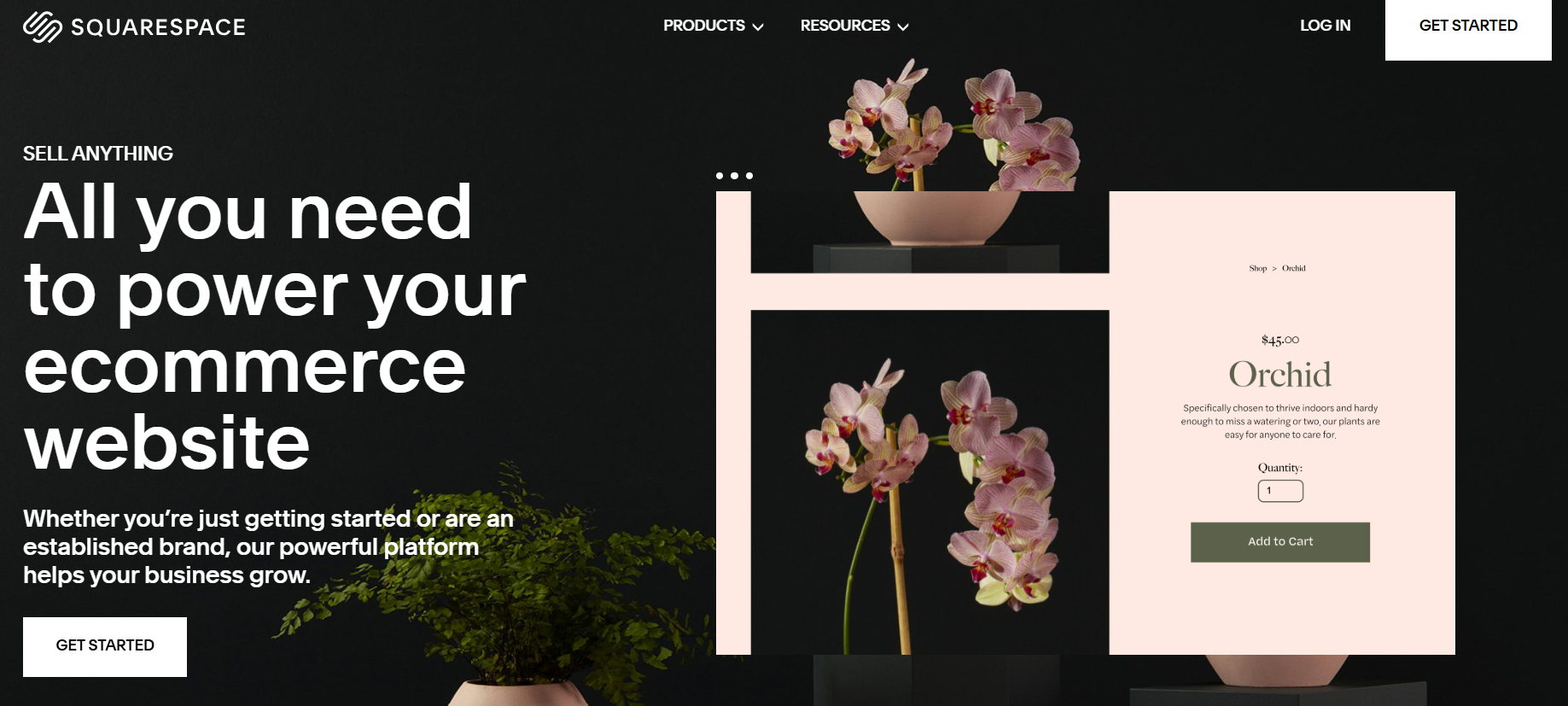
Squarespace is a website builder and hosting platform designed for users who value simplicity and strong visual design. It was originally built for creatives but now offers integrated eCommerce tools that make it a great Shopify alternative for small businesses selling online.
It’s also ideal for those who want a clean, modern website without the complexity of managing third-party apps or advanced backend settings. It works best for businesses with smaller product catalogs and a strong focus on brand presentation.
Key unique features
- Integrated eCommerce capabilities. You can sell both physical and digital products, manage inventory, and handle shipping—all within Squarespace. Features like subscription selling and member areas can diversify your revenue streams without relying on third-party apps.
- Design templates and layouts. You can choose from over 140 templates to create a professional-looking website that reflects your brand’s identity. On top of that, you can customize layouts, fonts, and color schemes to make your site unique.
- AI tools. Squarespace comes with AI tools that save time and ensure your brand identity and content are cohesive.
- Marketing and analytics tools. Squarespace’s analytics dashboard provides insights into your site’s performance, helping you make informed decisions to optimize your marketing strategies.
Who it’s best for
- Design-focused brands, artists, and consultants who want a visually polished site to showcase their work or services.
- Businesses that rely on appointments, bookings, or packaged services with built-in scheduling tools.
- Users who value brand consistency from their website, email, and social media.
What users are saying
Squarespace earns high marks for its design quality and brand presentation. Users love the sleek templates and built-in tools for scheduling and selling services. It’s especially popular among creatives and consultants.
Though it is praised for benefiting artistic users, there are also mentions of limited customization features, unless you know how to code. There are other reviews saying the pricing is higher compared to platforms with similar features.
Here’s a review of a Squarespace user at G2, “I love the easy drag and drop features and also the clean and high-quality pictures.” They also voiced out their dissatisfaction, “Just the fact that it’s limited to designs. You can’t add some effects.”
Pricing and plans
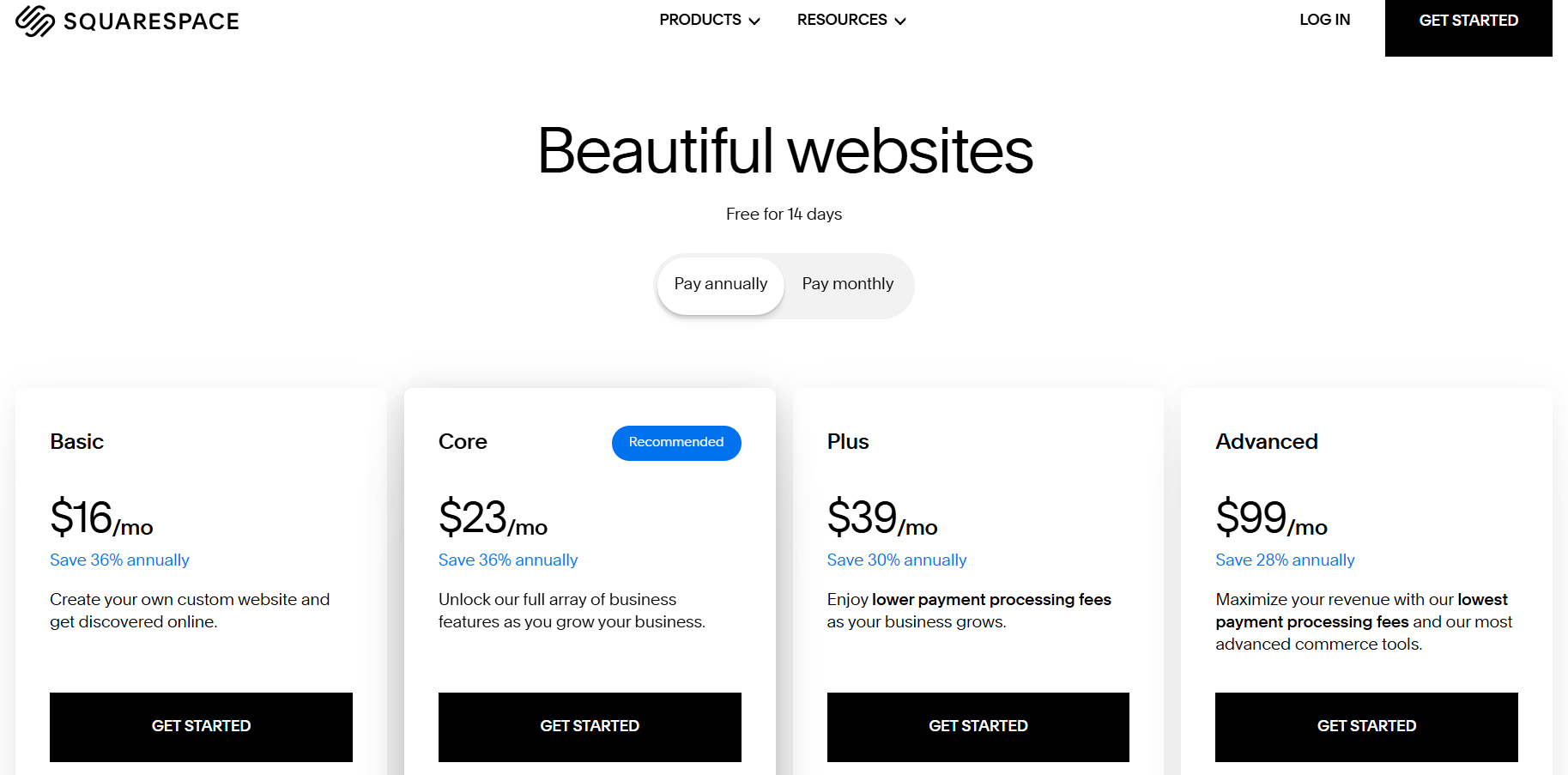
Note: Pricing is current at the time of writing but can change without prior notice. Please check with the provider directly for the most up-to-date pricing.
What is Shopify?
Shopify is a cloud-based eCommerce platform that lets you create, customize, and manage an online store. It’s built for all types of businesses, from small startups to large enterprises, and allows you to:
- Build your store using ready-made templates
- Add and organize products with photos, prices, and descriptions
- Accept payments, manage orders, handle shipping, and track inventory
- Sell on your website, social media, marketplaces, or in person
- Run your business from one dashboard
As a software-as-a-service (SaaS) platform, Shopify handles hosting, security, and updates. You don’t need to install or manage backend tech. Plus, it’s scalable, allowing you to start small and add new features as you expand.
The Shopify App Store also offers thousands of tools for marketing, analytics, reviews, and more.
It also accommodates customers with different needs thanks to its various pricing plans. These include Shopify for small to medium stores and Shopify Plus for high-volume businesses needing advanced features and support. While there’s no free plan, options like Shopify Lite let you add a buy button to an existing site.
Shopify also handles secure hosting and payment processing, so you can focus on selling.
Why do you need Shopify alternatives?
While Shopify has useful features, it doesn’t meet every business’s needs. As your online store grows —or if you’re on a tight budget— you may have limitations that require alternatives to Shopify.
Here’s why exploring Shopify competitors might be the smart choice for your online business:
- Rising costs and transaction fees. Shopify’s monthly costs can increase quickly. You may need to pay for themes, third-party apps, and extra fees. Some free Shopify alternatives offer the same tools at a much lower price.
- Limited design flexibility. Shopify offers professional templates. But those designs require Liquid code or an upgrade to higher-tier plans. Alternatively, platforms like WooCommerce or Magento offer more creative freedom.
- Platform lock-in. Shopify is a hosted SaaS solution. That means you’re limited to their infrastructure, pricing model, and feature roadmap. Self-hosted options like PrestaShop or OpenCart provide more flexibility.
- Scalability and advanced features. Shopify is great for getting started. But scaling can be challenging without upgrades. Features like B2B selling, headless commerce, and point-of-sale (POS) integration often require extra tools. Other platforms include many of these features out of the box.
- Diverse use cases and business models. Not every business has the same goals. Some need to sell online through an existing website, while others want fast website creation with drag-and-drop functionality. The best Shopify alternatives provide features to your exact business model—without compromising.
Our in-depth review of Shopify covers all the details if you’re interested and want to learn more about the platform.

There’s so much beyond Shopify. What’s your next move?
When it comes to Shopify alternatives, the best choice depends on your business goals. Wix shines for creatives who want design freedom, Squarespace is ideal for brand-driven service providers, GoDaddy suits local businesses needing quick setup, and Weebly is great for sellers already using Square.
But if you’re looking for an all-in-one solution that combines affordability, reliability, and essential eCommerce tools, Network Solutions stands out.
We can help you build a business-focused website that is easy to create, design, and launch. We have all you need: domain registration, website hosting, an eCommerce website builder, website design, and even digital marketing services.
Ready to simplify your online business setup? Explore Network Solutions Website Builder and see how easy it is to start.
Frequently asked questions
All the Shopify alternatives claim to be easier and more affordable than Shopify. You need to scrutinize each platform and see which one best fits your business.
Wix is better for ease of use and design flexibility, while Shopify is better for advanced eCommerce features and scalability.
The “cheapest” eCommerce platform depends on what you mean by cheapest: lowest monthly cost, lowest transaction fees, or best long-term value. Looking at the numbers, Weebly is the cheapest since it offers a free plan, however, these are simply basic features that are very limited. Network Solutions offers the lowest monthly cost with robust features for eCommerce.


